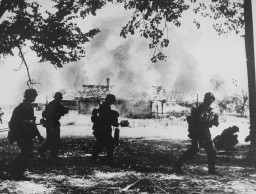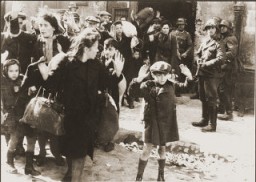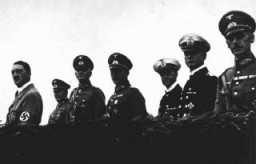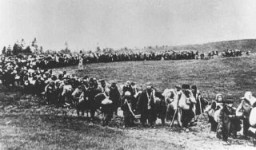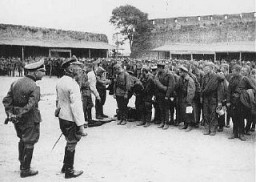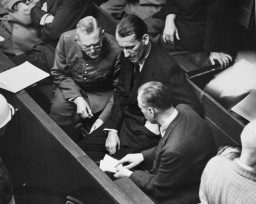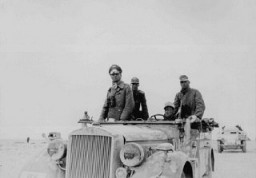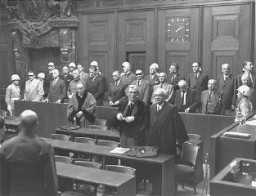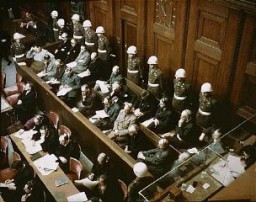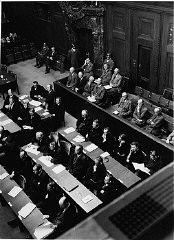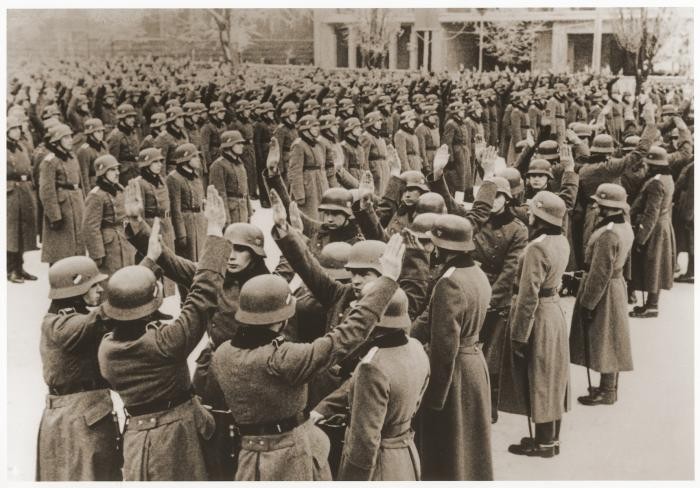
German Military Oaths
Until recently, many militaries swore their allegiance to their monarchs or rulers. Traditionally, the German military had sworn an oath of allegiance to the Kaiser. This changed during the Weimar Republic, when the oath became one of allegiance to the Constitution and its institutions. In Nazi Germany, German military personnel swore an oath directly to Adolf Hitler. This change had important repercussions during World War II.
-
1
The 1935 “Führer Oath” was voluntarily created by the military itself, not by Adolf Hitler.
-
2
The oath to Hitler was a key element in the Nazification of the German military.
-
3
Nazi ideology became more and more the basis of military objectives.
German Military Oaths: Background
Traditionally, the German military had sworn an oath of allegiance to the Kaiser. This changed after Germany's defeat in World War I and the establishment of a democratic government, the Weimar Republic, in Germany.
The political leaders of the new Weimar Republic sought to democratize the military by changing its social makeup and by changing the oath of allegiance. The new oath required soldiers to swear loyalty to the Weimar Constitution and its institutions, including the office of the Reich President, rather than to any individual.
The Weimar government also viewed the military as a potential threat. Much of the military's conservative leadership did not support the new Republic, and Weimar officials hoped that the oath would help provide legitimacy and security.
For many career soldiers, however, the idea of swearing an oath to a constitution was disconcerting.
The Führer Oath
Following Hitler's appointment as Chancellor in 1933, the military oath changed again, although soldiers were required to swear loyalty to their people and country (“Volk und Vaterland”), rather to individual leaders. All this changed with the death of German President Paul von Hindenburg on August 2, 1934. At this time, Adolf Hitler began to solidify his control over Germany. That same day, all military personnel in Germany swore a new oath of allegiance. The oath was no longer one of allegiance to the Constitution or its institutions, but one of binding loyalty to Hitler himself:
“I swear by God this holy oath, that I will render to Adolf Hitler, Führer of the German Reich and People, Supreme Commander of the Armed Forces, unconditional obedience, and that I am ready, as a brave soldier, to risk my life at any time for this oath.”
From this point forward, all existing units and all new military recruits would swear the so-called “Führer Oath.” The oath became law in July 1935. Civilian officials would swear a similar oath.
While many generals later claimed the oath was Hitler's idea, in fact, the highest ranking military leaders created it. A surprised Hitler himself acknowledged this by writing to Defense Minister von Blomberg: “I wish to express my thanks to you…for the oath of loyalty which has been sworn to me.
Impact of the Führer Oath
The oath had various effects on the German military. Symbolically and literally, Hitler became one with the military. His decisions carried the power of orders. There was no other competing authority to which the military owed allegiance. This was an important step in the larger process of Gleichschaltung (“coordination”), bringing all public and private organizations in line with Nazi goals and policies.
While it is difficult to generalize about the entire military, it is likely that most accepted the oath as a matter of course, as it hearkened back to the days of the Kaiser and to oaths sworn by the military throughout the history of Germany. The generals and High Command saw the oath as a way to control in which the military would be integrated into the Nazi state. They also viewed it as a way to curry favor with Hitler, with whom they held common interests.
On a broader level, the oath represented the beginning of a process of politicization, or Nazification, of the German military. Hitler's beliefs and goals became those of the military, which pledged allegiance to his cult of personality. Nazi ideology became more and more the basis of military objectives. The distinction between loyalty to the state and loyalty to Hitler—and the Nazi Party—swiftly eroded.
Accompanying this dedication to the Führer and politicization of the military was the impact it had on military conscription, which Hitler introduced in 1935. There was no place for conscientious objectors or those refusing to utter the Führer Oath. Refusal now represented a high crime against not only Germany, but also the Führer himself. This placed one group, Jehovah's Witnesses, in a particularly difficult position.
Jehovah's Witnesses do not believe in swearing oaths to governments or any temporal power, recognizing only God as their ruler. By 1939 thousands of Jehovah's Witnesses had been arrested, tried by judicial authorities and incarcerated in prisons and concentration camps for refusing to take the oath and serve in the German army. At least 250 Witnesses were tried by military tribunals and executed for their actions.
The relationship of the Führer to the new oath also increased the severity of an already draconian military disciplinary system. Crimes such as desertion (a form of refusal to serve) were seen as crimes against Hitler himself. Over 15,000 deserters were executed and thousands more sentenced to deadly penal units.
Finally, many potential military resisters to Hitler were placed in a dilemma they expressed—honestly for some, conveniently for others—as one of honor. They claimed the dilemma was between breaking an oath to Hitler and remaining dutiful soldiers.
Military Oaths Today
Today, most militaries swear an oath of allegiance usually to the state or a constitution, not to an individual leader. For example, the US military oath requires service people to “support and defend the Constitution of the United States against all enemies, foreign and domestic….”
Series: German Military and the Holocaust
Critical Thinking Questions
- What oaths do the military in your country take? How do they compare to the military oaths of this period?
- Are professional oaths binding, legally or personally? Why or why not? When can a sworn oath be broken, if at all?

